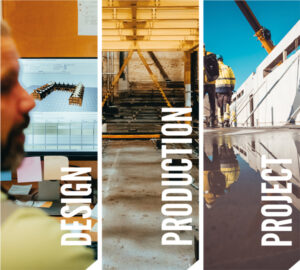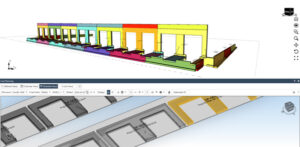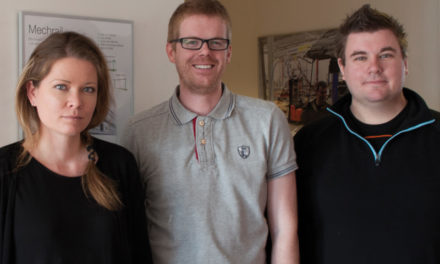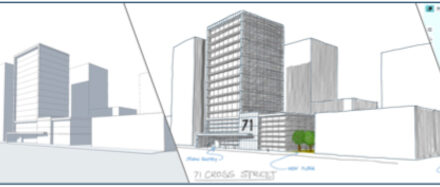With the rise of digitisation; advancements in Building Information Modelling (BIM), many consulting engineers and precast businesses are moving from 2D to 3D design of precast concrete elements.
– Precast is perfectly placed to exploit BIM, says Matthew Butcher, at British Precast. Precast firms are working in a controlled factory environment, which is ideal for the principles of design for manufacture and assembly (DfMA).
Design is a key part of the process, of course. But are you able to make the most of your resources (software, personnel, time and plant) without combining production planning; project management and the associated data into one system?

If you’re not fully integrating all parts of the process, then the answer must be no. It may also mean that you’re not best placed to take advantage of what some in the precast industry have termed “Offsite’s Second Coming”.
An integrated system would allow you to streamline all production and project processes into one controlled BIM dataset. Advancements with mobile and Cloud computing mean that you are now able to access project data from anywhere.
What if you could do away with spreadsheets, reduce time trying to find information and reduce errors from manually moving from one system to another? What if you could connect all Stakeholders to the same data set to improve the communication and collaboration on projects with real-time relevancy?
How To Start?
One of StruSoft’s customers in the UK, FP McCann. Have just successfully completed their first successful BIM level 2 project, integrating IMPACT with their existing design software and in-house systems.
By exporting their Tekla 3D model data into IMPACT’s open database, it’s possible to use this data to drive production; planning and project management – and it’s this exact solution that helped FP McCann to successfully deliver bespoke precast units for the new logistics hub in Daventry.
 Structural precast is a complex and multi-skilled business, not least because it’s a bespoke product competing against traditional on-site methods of construction. This places huge time pressures on precast businesses; to prepare 3D conceptual designs, calculate accurate costs and delivery schedules. The demands on design, production and project management resources and workflows are considerable.
Structural precast is a complex and multi-skilled business, not least because it’s a bespoke product competing against traditional on-site methods of construction. This places huge time pressures on precast businesses; to prepare 3D conceptual designs, calculate accurate costs and delivery schedules. The demands on design, production and project management resources and workflows are considerable.
These three disciplines: design, production and projects, are key to the success of your precast project. Therefore, speed of reaction, communication, collaboration, control over logistics, the flow of information and integration between them are paramount.
Without parallel development of production, project and logistics workflows, the benefits of the new data-rich 3D models cannot be fully realised. With a lack of industry BIM standards, there is no blueprint to follow.
One Size Does Not Fit All
Wrapped up in the three pillars of precast are a myriad of systems, processes and workflows. What’s more, no two precast businesses are the same. There isn’t a “one size fits all” solution.
 Because of this, precast business systems and processes have tended to evolve with small incremental improvements over time.
Because of this, precast business systems and processes have tended to evolve with small incremental improvements over time.
As the first stage, and with the rise of CAD and 3D modelling systems, it makes sense for precast businesses to address their design processes first.
The biggest challenges F.P. McCann faced with the implementation was that processes had to be modified to suit the new software and also the software had to be modified to suit some of the process.
– We were supported throughout by StruSoft, who developed the Tekla Base Tools API specifically to support our current design processes and integrate IMPACT with our in house systems. More efficient planning alone justifies the investment as well as the Element Control to massively reduce errors in the production process. Dave Norry, F.P. McCann.
Evolution Not Revolution
The true cost of investment in new software and technology can seem to be prohibitive, and it’s easy to think that to fully reap the benefits, you must start from scratch and spend huge sums on equipment, software and training.
 There’s also a consideration for hidden costs such as downtime, or the consequential costs of incorrect use and workarounds that become commonplace when a hodgepodge of systems and workflows are used.
There’s also a consideration for hidden costs such as downtime, or the consequential costs of incorrect use and workarounds that become commonplace when a hodgepodge of systems and workflows are used.
It’s not just about maximising efficiency in design, however. As projects requiring BIM will only increase in number, improving your ability to create information models (IFC) and utilise a common data environment is crucial.
By mapping information into an open database you’re then able to integrate the three key areas of precast, using common data and standards to drive continuous improvement in design, production and project workflows.
Digital data can now be imported into IMPACT from a wide range of sources: Tekla; Revit; CAD; XMS (Excel spreadsheets); XML and IFC.
This means everyone – from your own employees to other project stakeholders – can access to the same information, in real-time and from anywhere. Not just during the design phase, but throughout project planning, production processes and beyond.
And perhaps most importantly, this means better outcomes for your projects, your clients and your bottom line.
Get Started Now
Do you want to realise a BIM workflow and improve your precast projects?
Are you spending too much time trying to find information; manually moving from one system to another with hundreds of emails flying around?
Want to go paperless and get all Stakeholders connected to the same information; in real-time and from anywhere?
StruSoft can help you get started; please feel free to contact me to discuss your current set-up; organise a showcase or click this link for a free trial of IMPACT and see how.
Paul Tate | VP Marketing







